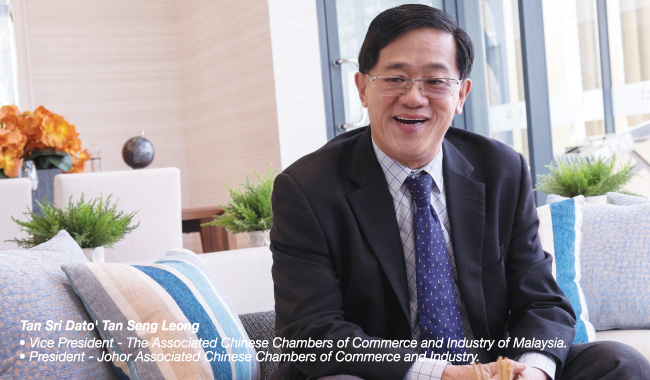Vouch 15 Cover Story – Interview with Tan Sri Dato’ Tan Seng Leong
Johor Bahru Property & Ecominic Outlook in 2016
Johor Bahru is going to be the New Gold Mountain
Tan Sri Dato’ Tan Seng Leong is the founder and Executive Director of BCB Berhad, a public listed company with core businesses in property development, investment and management. Under his capable leadership and concerted team efforts, BCB’s motto of ‘building communities and beyond’ has achieved great success not only in many Johor township development projects but also in its growth from a humble beginning to become an established developer in Malaysia. As part of his business commitment, Tan Sri Dato’ Tan also serves as President of Johor Associated Chinese Chambers of Commerce and Industry (JACCCI) actively dedicating himself to business groups and community organisations. He believes that impossible challenges are possible to overcome with effective solutions as the word itself says ‘I’m possible’ with the insertion of an apostrophe. This is how he transforms limitation into possibility and achieves success. It has been a pleasure listening to his sharing on property development and learning from his insights on business and entrepreneurship including family business succession.
What is your view on the property market in Johor Bahru for the coming year? Will the property market remain buoyant?
Johor Bahru is undergoing major transformations and the outlook for property market remains favourable. As we know, population growth and infrastructure development generate demand for housing and commercial facilities.
From 2006 to 2016, the population of Johor Bahru increased from 1.3 million to 2.1 million or by about 60%. Under the Iskandar Malaysia development plan, the region will enjoy the state-of-the-art facilities and accessibility through infrastructure projects, aspiring to become a self-contained metropolis with a projected population of 3 million by 2025. It is envisioned that a financial centre, medical facilities, international recognised universities, high-end housing, luxury hotels, theme parks, media production studios and the like are catalysts projects that will be driving demand. For instance, the completion of the High Speed Rail (HSR) project will further spur growth in the Iskandar area with a 44% increase of population within Gerbang Nusajaya itself.
Johor Bahru is going to be the New Gold Mountain (新金山) , which brought to mind Old Gold Mountain (旧金山) or San Francisco of California where people sought their fortune in gold mining.
What challenges does the property market face in the coming year and how do you see ways to address these challenges?
Johor Bahru is perceived as a conservative property market and one of the challenges it faces is investor confidence which has a considerable influence on investment decisions.
However, ‘Iskandar Malaysia’ (IM) is a 20-year comprehensive development vision which aims to drive the development in south Johor. In the first five years, we see the planning, groundwork and foundation works underway and in the 2nd five years the completion of major infrastructure and amenities such as the highways, education facilities, tourist destinations and other catalyst projects will follow. By the 3rd five years, people will begin to see the realisation of a dream but it is not until the 5th five years that the market matures. How to change consumer and business confidence levels is the challenge. The media can play an important role in this process by diffusing accurate and timely information to support business decisions.
As the sale of commercial properties and the rent derived from them are subject to Goods & Services Tax (GST), how does this impact on an investor’s decision in purchasing commercial properties?
Given that commercial properties are not GST-exempt goods, the implementation of GST will have an impact on these segments. Prices of properties are expected to increase as investors will incur higher administrative costs and for developers, the costs of construction and building materials will also increase since they are not exempted from GST.
While there will be a decline in demand in the GST adjustment period, its long-term impact is likely to be minimal as consumers will eventually get accustomed to the new tax and adjusted accordingly. The property market is unlikely to see drastic changes as GST will be factored in by developers taking into consideration the higher cost of building materials and construction services.
Nonetheless, the cost of living is sure to increase with GST borne by end consumers. Some investors may want to invest in equities as a better hedge against inflation and investment deterioration.
There are concerns that too many high-rise apartments and condos are being built in Johor Bahru. What is your view?
While there is general feeling that there are too many high-rise residential units in Johor Bahru, oversupply is unlikely to be a concern in the longer term considering the market’s ability to absorb the supply brought by these projects.
There may be thousands of units in the pipeline but there are not all being built simultaneously. Moreover, population growth takes place over time – we will see a continual increase in the next 10, 15, 20 years, by which time the demand situation will change. There is also the prospect of Singaporeans buying second homes in Johor Bahru taking advantage of the Rapid Transit System (RTS) accessibility and the ‘lower cost of living’ across the Strait to have a better lifestyle such as larger serviced apartments at the price of HDB flats.
Looking in this context, oversupply where high-rise residential units is concerned will not be an issue.








No Comment